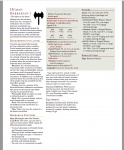BookBarbarian
Expert Long Rester
Based on the Angry article I had a go at revising the character sheet to promote the ability scores and demote the skill & saving throw proficiencies. I quite like the result:
View attachment 106218
A while back on the DMsGuild WotC released a bunch of premade characters who's 'sheets' looked more like NPC statblocks.
I liked how simple it looked.



